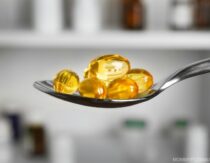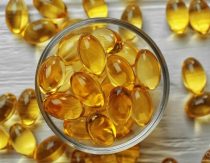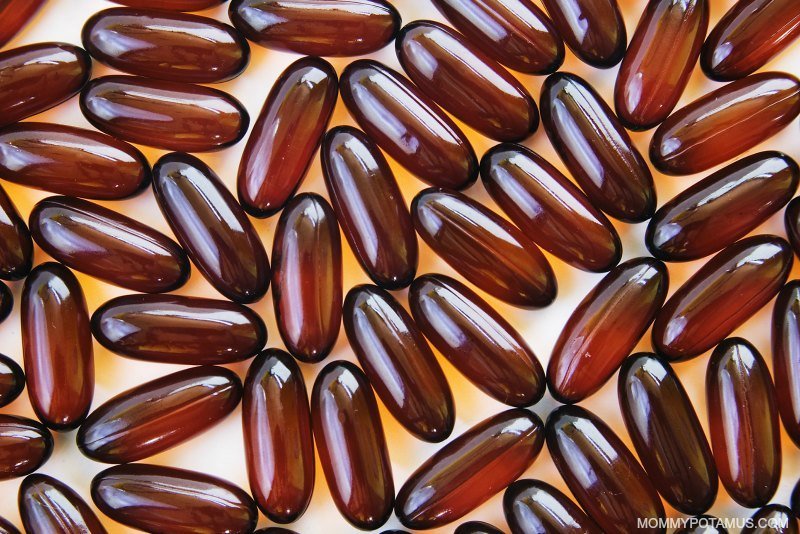
Imagine this: You join a community softball team, and it turns out you’re pretty amazing. One day, you’re in the dugout, asking for a bat, and someone places a dark, winged-creature in your hands. Same name but the same thing, right? It’s a little like that when it comes to vitamin E, which is a name that actually refers to eight distinct compounds: 4 tocopherols and 4 tocotrienols.
Although more similar than a baseball bat and a flying bat, tocopherols and tocotrienols have some distinct differences that impact their physiological effects. (1) Designs for Health founder Jonathan Lizotte calls tocotrienols “the one supplement I would want with me if I was stranded on a desert island.” (2)
On the other hand, according to The American Heart Association says vitamin E supplements “may do more harm than good.” (3)
Confused yet? When I first heard about the controversy around vitamin E, I was too. In this article I wrote about why I ditched my tocopherol-based vitamin E supplement, and in this post we’ll dive into:
- Research-backed benefits of tocotrienols for skin, brain health, gut health and more
- Sources of tocotrienols and which supplement I use now
- Safety considerations
First, though, I want to mention that none of these statements have been evaluated by the FDA, this article is not medical advice, and it is not meant to diagnose or treat any condition. As always, please talk with your healthcare provider about any supplements you are considering. Now that we’ve got that out of the way, let’s dive in.
Tocotrienols: The”Vitamin E of the 21st Century”
A lot of the time when people say “vitamin E,” they really mean just one form: tocopherols. That’s probably because in 1922 it was discovered that rats could not reproduce without a specific form called alpha-tocopherol. Vita means “life” in Latin, and tocopherol literally translates from Greek as “birth” (from tókos) and “to bear or carry to” (from phérein).In essence, the combined meaning is “to successfully carry to birth.”
It wasn’t until the 1950’s that researchers realized there was another major subgroup of vitamin E: tocotrienols. Altogether, there are actually eight distinct members of the vitamin E family:
- 4 tocopherols – alpha, beta, gamma and delta
- 4 tocotrienols – also alpha, beta, gamma and delta
“For a long time, tocotrienols were like the Cinderella of Vitamin E science—relegated to the corner and ignored,” writes Michael Ash DO. ND. BSc (Hons) RNT. (4)
Ignored, that is, until studies on tocopherols found little benefit and potential harm, while studies on tocotrienols showed beneficial effects for brain health, gut health, optimizing cholesterol levels, liver health and more.
The health benefits realized by annatto tocotrienol go beyond that of any other nutrient I know. It’s the one supplement I would want with me if I were stranded on a desert island! This is a change for me as after 35 years in this industry, my top desert island supplements have switched between magnesium and fish oil and now it stands firmly as annatto tocotrienol alone. A minimum of 150 mg per day is a must for every adult alive.” – Jonathan Lizotte, Designs for Health Founder and Board Chairman (2)
Though it kind of goes without saying, when I read that the founder of a well-respected supplement company calls tocotrienols derived from the annatto plant his “desert island” first choice, I had to find out why.
So, what makes tocotrienols unique?
As we’ve seen with the chaga mushroom, which thrives in semi-arctic climates at high altitudes, plants facing extremely challenging stressors often produce the most potent protective compounds. These compounds, called antioxidants, protect against cellular DNA damage in both plants and humans.
In an interview with Ben Greenfield, scientist and vitamin E expert Dr. Barrie Tan seems to suggest that tocopherols are produced to counteract mild to moderate forms of oxidative stress, while tocotrienols are produced to counteract more challenging oxidative stress situations.
That makes sense considering that tocotrienols are estimated to have 40-60 times more antioxidant activity than tocopherols. (5) (6)
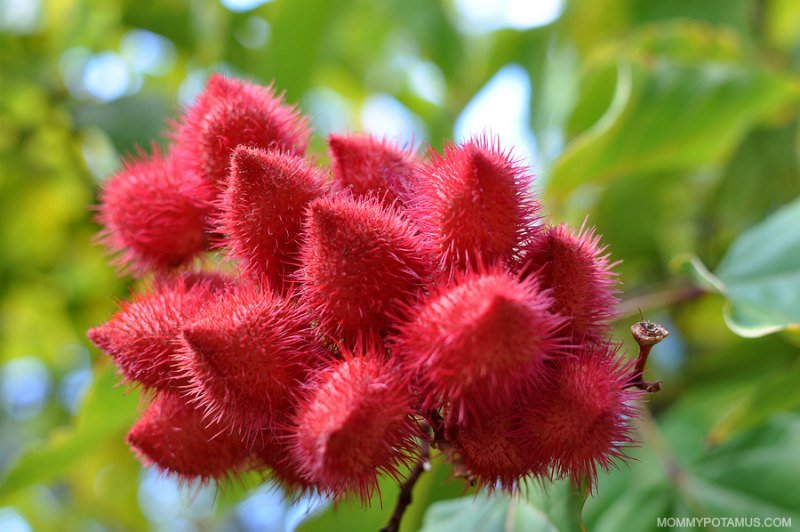
The Lipstick Tree & Molecular Magic
By what molecular magic do tocotrienols protect the heart, brain and liver? Research is now elucidating many of the pathways.” – Michael Ash DO. ND. BSc (Hons) RNT (4)
To understand how our bodies use tocotrienols, it helps to know how plants use them. So let me tell you about the gorgeous, fiery-red seeds of the lipstick tree (annatto plant). Known in some places as achiote, this plant makes carotenoids that produce a rich red pigment. The pigment has long been used by “indigenous people for a variety of purposes including body paint, insect repellant, food colorant, inks, dyes, sunscreen, soap additives and fabric colorant.” (7)

Carotenoids are relatively fragile and easily damaged by photo-oxidations (aka sunlight), but the lipstick plant is phototrophic. In other words, it loves sunlight and actually follows the sun like sunflowers do . . . all while protecting its rich pigments from sun damage. How does it do this? According to Dr. Tan, it’s because it almost exclusively makes tocotrienols instead of tocopherols. So far it’s the only plant we know of that does this.
Annatto (Bixa orellana) also has a rich tradition of medicinal use for a variety of concerns – many of which are now being studied in clinical trials – and is the source of the tocotrienol supplement I use. More on that later, but first you might be wondering what tocotrienols can be used for (other than to make awesome body paint, that is.)
Health Benefits of Tocotrienols
Tocotrienols exhibit health benefits quite different from that of tocopherols, and in most cases, these activities are superior for human use,” states biochemist Bharat B. Aggarwal, PhD, of The University of Texas M.D. Anderson Cancer Center in Houston, where he and his team study curcumin, resveratrol, tocotrienols and other natural compounds” (4)
With that in mind, here’s what research has to say about the benefits of tocotrienols:
1. Helps Protect The Brain & Nervous System
What happens when you administer a small amount of tocotrienols to brain cells before administering neurotoxins? According to this study and this study, more of the cells survive. Of course, this was done in a petri dish because it’s unethical to administer neurotoxins to people, but we know from other human studies that tocotrienols have powerful neuroprotective properties. (8)
Unlike some other antioxidants, tocotrienols are able to quickly and easily reach the brain, making the subject of research for a variety of concerns. (9)
2. Protects & Nourishes Skin
Remember how I told you that indigenous people use the lipstick tree to make sunscreen? There may be something to that.
Because they’re such potent antioxidants, tocotrienols are thought to counteract dermal oxidation – aka damage to the proteins on skin which causes wrinkles and collagen loss. In this study, mice who consumed tocotrienols were more resistant UVB-induced skin damage.
In addition to dietary intake, at least one study suggests that applying tocotrienols directly to skin might be beneficial as well. (4)
Also, more research is needed, but one small study found that tocotrienols seemed to positively influence hair follicle regeneration. (10)
3. Helps With Gut Health In Stressful Conditions
When researchers compared the effects of tocotrienol and tocopherol consumption on stressed rats, they found that both forms counteracted free radicals generated by difficult conditions.
However, the rats taking tocotrienols were able to maintain normal gut pH, while the rats taking tocopherols experienced stress-induced changes to gut acidity. (11)
4. Supports Healthy Cholesterol Levels & Flexible Arteries
Flexible arteries and healthy lipid profiles are both key indicators of cardiovascular health.
In this study, researchers gave men either 50 mg, 100 mg or 200 mg of mixed tocotrienols every day for two months. The groups who received 100 or 200 mg showed significant improvement in arterial elasticity (flexibility). (12)
And in this study, participants who received 300 mg of mixed tocotrienols for six months had significantly healthier total cholesterol levels than the group who received a placebo.
5. Healthy Inflammatory Response
“Tocotrienols work not only as antioxidants, but through specialized mechanisms” that directly support a healthy inflammatory response. (4)
That’s pretty important, given that chronic inflammation is a key factor in DNA damage.
6. Supports Liver Health
As we talked about earlier, tocotrienols are able to easily able to reach the brain – the same is true for other lipid-rich organs like the liver, spleen, kidney, and heart. Just like with brain cells, studies have found that tocotrienols support resilience when liver cells are exposed to intentional acetaminophen and hydrogen peroxide-induced injury. (13) (14)
Also, due to its positive impact on lipid profiles, it may be helpful for individuals with a buildup of fat in the liver.
7. May Help With Bone Density & New Bone Formation
Some preliminary studies indicate that tocotrienols may support the retention of bone mass as we age, and might even play a role in new bone formation. (15) (16) (17)
What foods are high in tocotrienols?
The highest sources that we know of are:
- Annatto (estimated 100% delta and gamma tocotrienols)
- Red and purple palm oil (estimated 50% delta and gamma tocotrienols, 25% alpha and beta tocotrienols, and 25% tocopherols)
- Rice bran oil (estimated 35% delta and gamma tocotrienols, 15% alpha and beta tocotrienols, and 50% tocopherols)
There are some other sources as well – barley oil and buckthorn berry are two.
Does taking tocopherols with tocotrienols interfere with the benefits?
Possibly. According to this animal study, the cholesterol-related benefits of tocotrienols were reduced when the supplement contained significant amounts of alpha-tocopherol. They concluded that optimal preparations should contain less than 15% alpha-tocopherol and at least 60% gamma and delta-tocotrienol.
And in this study, participants who received alpha-tocopherol supplements experienced a drop in plasma levels of gamma-tocotrienol.
However, one animal study concluded that when taken together, alpha-tocopherol actually increased the absorption of tocotrienols into organs such as the brain and liver. (18)
Tocotrienol Safety & Dosage
According to Michael Ash DO. ND. BSc (Hons) RNT, “They have already concluded [completed] human trials proving that oral tocotrienols are both safe and well distributed in organs and the brain. They are currently researching optimal dosing regimens, before they design a study on tocotrienols in humans.” (4)
However, a general contraindication to be aware of is that “Vitamin E may increase the risk of bleeding, especially if you are taking blood thinners, such as warfarin (Coumadin), aspirin, or clopidogrel (Plavix).” (19)
In terms of dosage, most studies have used a dosage of 200 mg per day. However, they were often looking for the therapeutic dose related to a specific health concern. According to Dr. Barrie Tan, “100-200mg of tocotrienol per day is adequate for lipid antioxidant protection for all cell membranes and lipoproteins.” (20)
He adds that “The recommended dose for a person with a mild chronic condition is 300-450mg per day, and for a person with an advanced chronic condition, 450-600mg per day. Clinical trials indicate that the highest dose taken safely for 24 months is 900mg per day. Most indications call for 300-600mg per day dosages.”
However, those are general guidelines and not specific recommendations tailored to an individuals specific circumstances. As always, please talk with your healthcare provider about supplements you are considering.
Choosing a Tocotrienol Supplement
Some people say you should choose a supplement that just contains tocotrienols since tocopherols might interfere with the benefits, while others say that they’re fine to take together.
Although I can’t say what anyone else should do, I personally avoid supplementing with alpha-tocopherol for a few reasons:
- It’s been shown to reduce levels of gamma-tocopherol and other beneficial tocopherol forms in the body. Each tocopherol has its own functional role, so I want a full complement rather than just one.
- Studies indicate that doses of 400 mg or more may do more harm than good. (I’ve written about possible reasons why here.)
Instead, I eat a whole-food based diet that’s rich in a full complement of tocopherols – nuts, seeds, avocado, salmon, red bell peppers, etc – and supplement with tocotrienols. According to Dr. Tan, the amount of tocopherols found in foods will not interfere with tocotrienol absorption. (20)
Since I’m already getting tocopherols via my diet, I opted for an annatto-based supplement that is virtually free of tocopherols.
Here are three annatto-based tocotrienol options:
- Designs for Health Annatto-E 150 – Contains 150 mg of delta and gamma tocotrienols (this is what I use)
- Designs for Health Annato-E 300 – Contains 300 mg of delta and gamma tocotrienols
- Allergy Research Group Delta Fraction Tocotrienols – Contains 125 mg of delta and gamma tocotrienols
Do you have a question about tocotrienols? Please leave it in the comments below!
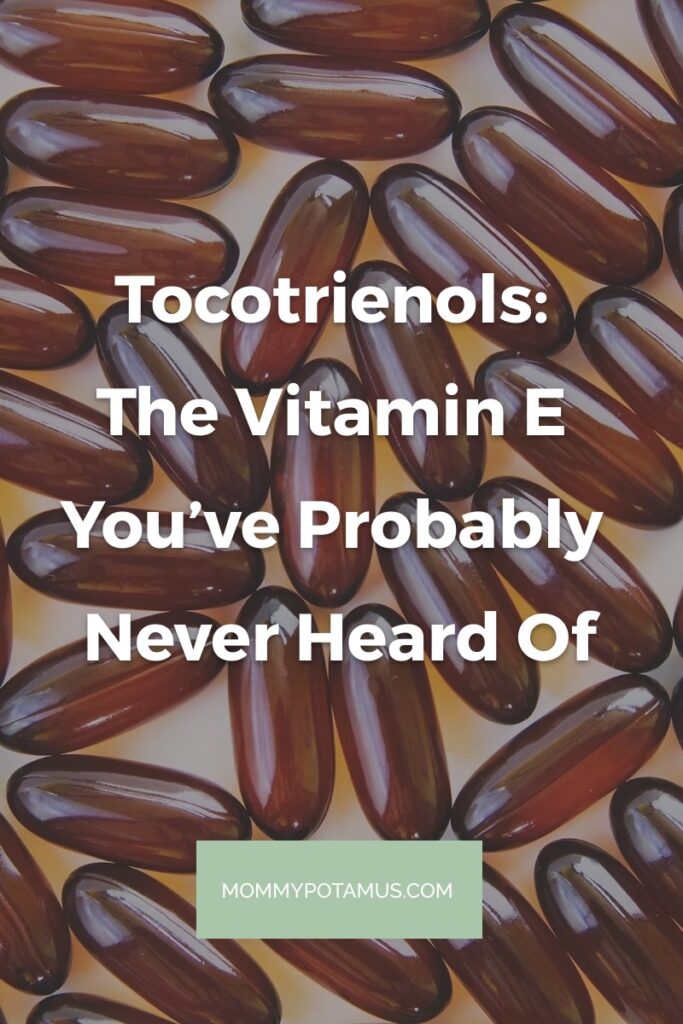
Sources
1. Aggarwal, Bharat B. et. al. (2010) Tocotrienols: The Vitamin E of the 21st Century: Its Potential Against Cancer and Other Chronic Diseases
2. PRWeb (2018) Designs for Health Launches New Clinically Researched Natural Vitamin E Tocotrienol Product
3. Science Daily (2004) High Doses Of Vitamin E Supplements Do More Harm Than Good
4. Ash, Michael (2013) The Next Generation Vitamin E How Tocotrienols Benefit the Heart, Brain and Liver
5. Suzuki, YJ et. al. (1993) Structural and dynamic membrane properties of alpha-tocopherol and alpha-tocotrienol: implication to the molecular mechanism of their antioxidant potency
6. Serbinova, E et. al. (1991) Free radical recycling and intramembrane mobility in the antioxidant properties of alpha-tocopherol and alpha-tocotrienol
7. Missouri Botanical Garden. Bixa orellana
8. Meganathan, Puvaneswari and Fu, Ju-Yen (2016) Biological Properties of Tocotrienols: Evidence in Human Studies
9. Sen, CK et. al. (2004) Tocotrienol: the natural vitamin E to defend the nervous system?
10. Beoy, Lim Ai et. al. (2010) Effects of Tocotrienol Supplementation on Hair Growth in Human Volunteers
11. Azlina, MF et. al. (2005) A comparison between tocopherol and tocotrienol effects on gastric parameters in rats exposed to stress
12. Rasool, AH et. al. (2008) Arterial compliance and vitamin E blood levels with a self emulsifying preparation of tocotrienol rich vitamin E
13. Tan, Cheau Yih et. al. (2015) Comparative hepatoprotective effects of tocotrienol analogs against drug-induced liver injury
14. Ahsan, Haseeb et. al. (2014) Pharmacological potential of tocotrienols: a review
15. Ima-Nirwana, S and Suhaniza, S (2004) Effects of tocopherols and tocotrienols on body composition and bone calcium content in adrenalectomized rats replaced with dexamethasone
16. Ming, Wang et. al. (2012) Palm Tocotrienol Supplementation Enhanced Bone Formation in Oestrogen-Deficient Rats
17. Muhammed, Norliza et. al. (2012) Two Different Isomers of Vitamin E Prevent Bone Loss in Postmenopausal Osteoporosis Rat Model
18. Hansen, H et. al. (2015) Tocopherol and annatto tocotrienols distribution in laying-hen body
19. Penn State University. Vitamin E
20. Dr. Barrie Tan. Tocotrienol FAQ

